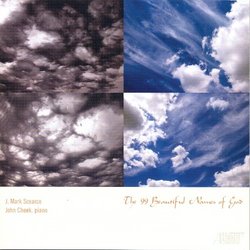Musical Contemplations on a Protean God
J Scott Morrison | Middlebury VT, USA | 09/23/2009
(5 out of 5 stars)
"I had never heard of composer J. Mark Scearce and as a non-religious person I didn't expect the name and intent of this set of 88 short piano pieces to draw me in. And yet they did. There is something mysterious and appealing about the title: The 99 Beautiful Names of God. I didn't know until I held the CD in my hand that the title is taken from the Koran. (Mohammed taught that 'The Most High God has 99 names and whoever enumerates them will enter into paradise.')
The work consists of a series of short sections, generally played without pause, each named for one of the Islamic names for God (e.g., The Most Gracious [Ar-Rahman], The Sublime [Al-Jalil], The Wise [Al-Hakim], The Destroyer [Ad-Darr], The Everlasting [Al-Baqi], The Protector [Al-Wali], The Avenger [Al-Muntaqim]). There are 88 sections, rather than 99, because Scearce has combined some of them (e.g., The Giver of Life and The Taker of Life [Al-Muhyi and Al-Mumit]). None of the sections lasts longer than a minute or so, and some are much briefer than that. Scearce says he pondered each name in turn and responded musically. The composing process took four years. (It is amusing, undoubtedly intentional and perhaps with hidden meaning, that there is clear reference in the very first and last sections to the shape-note hymn, Amazing Grace.)
The music itself is tonal and simple, often sparsely harmonized, mostly slow, almost trance-like at times. Structurally it reminds one of, say, Satie (without the sass) or Mompou (without the Spanish color) in its simplicity. One is occasionally reminded of some of the earlier pieces from Bartók's 'Mikrokosmos.' It would be easy to dismiss the music as simple-minded, but it is not. There is a cumulative power over the music's 71 minutes to evoke a contemplative, even philosophical or religious, turn of mind, at least for this listener.
Scearce says the original impetus for composing the work was to give a pianist-colleague, ill from cancer, a set of small pieces that would bring her back to her instrument and back to health. Somehow this intent can be heard in the music.
John Cheek is a fine pianist who gives these pieces precise, evocative and musical performances.
Scott Morrison"


 Track Listings (1) - Disc #1
Track Listings (1) - Disc #1